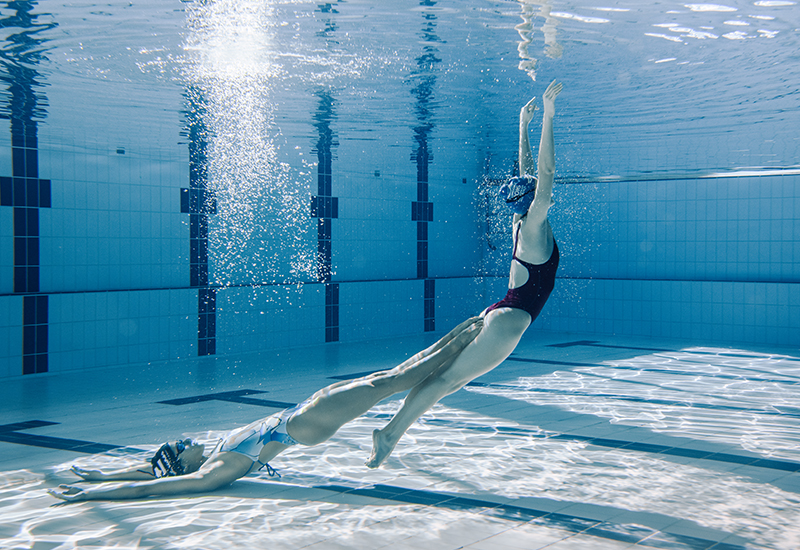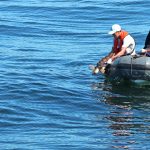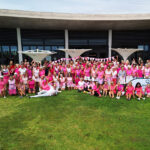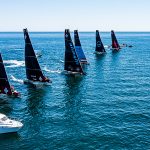Before she could walk, she could swim. As a baby, Sylvia Hernandez Mendizabal remembers climbing into the fountains of Madrid. With a nostalgic smile, she recalls the feeling of weightlessness water provided, how her body could move differently, with more freedom and less effort. When she talks about water her energy shifts, her passion for the healing and restorative powers of water is tangible.
Luckily for the city of Lagos, Sylvia’s love for water includes the ocean and surfing. Ultimately, this primal passion is what brought her to Portugal. Although she fell in love with her first surf instructor here – and this is another reason why she stayed – it began with her need to be close to the ocean.
Born and raised in Madrid, Sylvia knew from an early age that she would eventually live close to the ocean. But it took many years of hard work and education before she finally decided to settle in Lagos permanently.
“Water is my life. The ocean is my life,” she says as we sip steaming coffee in a room of glass overlooking the sparkling municipal pool in the city centre. Outside, the January air is unusually frigid. The morning mist is so thick it almost reaches the parking lot from the horizon, as if the clouds themselves decided to descend from the sky.
But for Sylvia, just like her duet swimmers, Maria Beatriz Gonçalves and Cheila Vieira, there are no days off. Rain or shine, freezing or sizzling, they train. Watching them is like seeing a moving piece of aquatic art. They glide through the water as gracefully as swans, twirling their legs like ballet dancers in synchronous timing, holding their breath and then leaping into the air with movement choreographed specifically for the music. To watch them is to be mesmerised by their exactness, their stamina, their beauty and their strength.
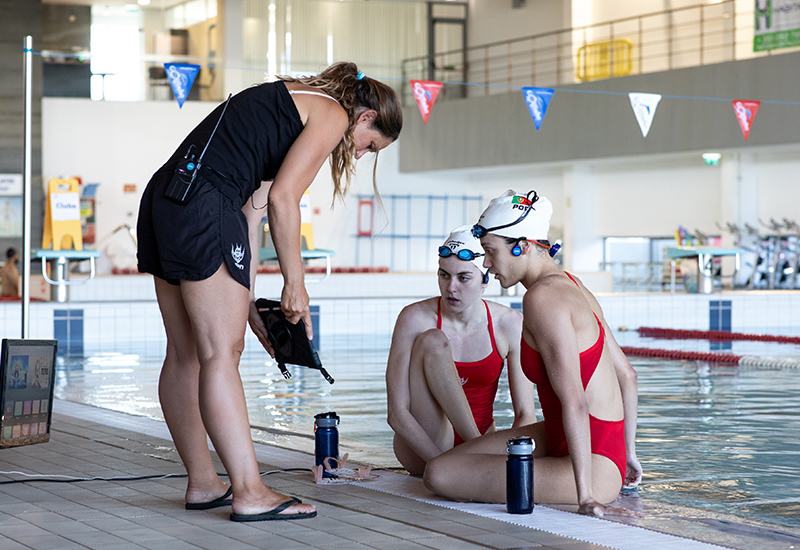
In less than one month, the trio will fly to Qatar for the Olympic Artistic Swimming Championships at the beginning of February. Their place in the competition will determine whether or not they compete in the summer Olympics in Paris in 2024.
Although their chances are good, there are never any guarantees. If one of them is ill or one leg is off by even two degrees, it could be game over. And this, says Sylvia, is one of the biggest challenges: to be mentally strong. Prepared to handle disappointment. Able to overcome the obstacles life throws in the way. Capable of getting in cold water and powering through – even when you’re sick and even if it’s freezing outside or the water isn’t warm enough.
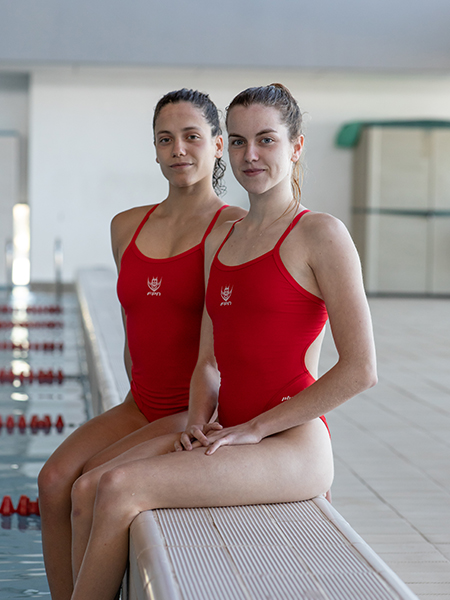
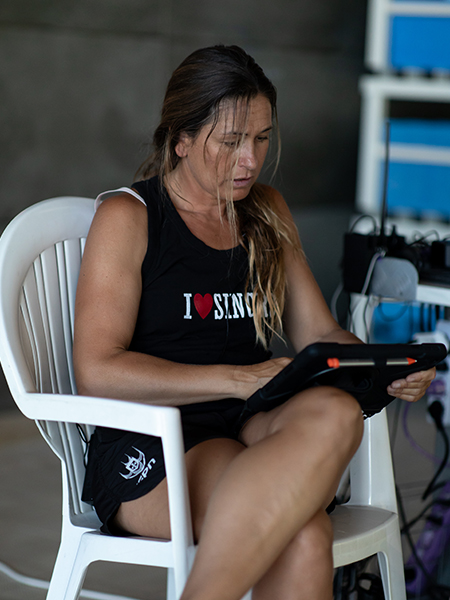
Beatriz, 24, and Cheila, 25, feel mentally prepared. The pair have been swimming together since they were 13 and are ready to do whatever it takes to swim together in the Olympics, their dream for over a decade.
For Sylvia, it is also the realisation of a dream. Yet beneath the pride, a hint of sadness slips in when she talks about her own career shift as a young athlete. After training for many years as a synchronized swimmer, she decided that although she was good, she wasn’t good enough to make it to the top. “I didn’t have the perfect body shape to go to the levels I wanted to reach,” she explains. “I was ready to walk away from this sport forever and never look back.”
One of her colleagues on the national team, Ana Montero, saw another potential: to be a great coach. And despite being only 41, Sylvia has spent more than half her life doing just that. Her education is impressive.
In 2005, she finished her Bachelor of Sport Science at the Polytechnical University of Madrid and received her national coach swimming certification. In 2007, she obtained her national coach certificate of synchronized swimming. From there, she went on to finish her doctoral degree in Proprioceptive Training for Support Skull in Synchronized Swimming and graduated cum laude. She has published numerous scientific papers and coached teams in Columbia, Spain, Turkey and Switzerland. She speaks four languages and she has the quiet confidence of an elite master.
For the non-scientists among us, Sylvia’s ‘proprioceptive’ thesis examined awareness of the nerve endings in the muscles and joints that operate when the body moves. It is the deep study of how the muscles work and our consciousness of this ability. In the water, this skill is altered because the body moves differently when confronted with the weight and mass of hydrogen and oxygen together.
“When we’re underwater, we don’t have the use of our eyes in the same way,” she explains. “We have to learn how to make use of different senses and parts of our brain to feel the movement better in the water and to understand how our muscles function in water.”
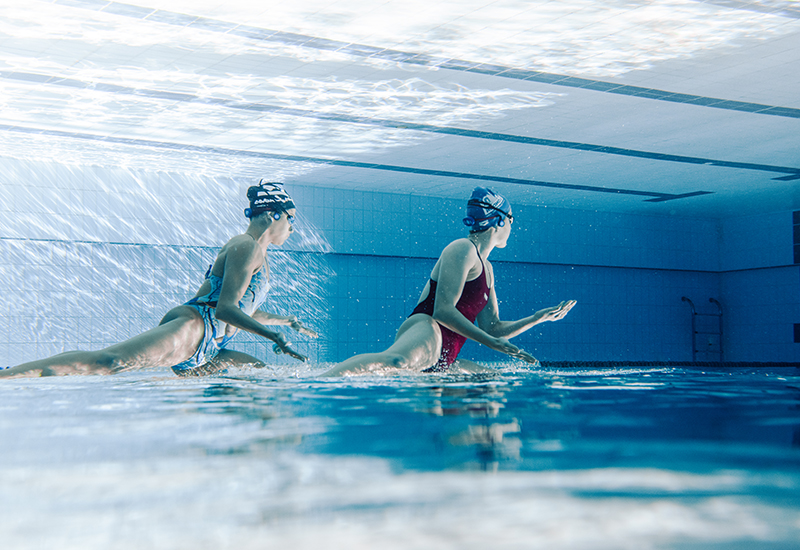
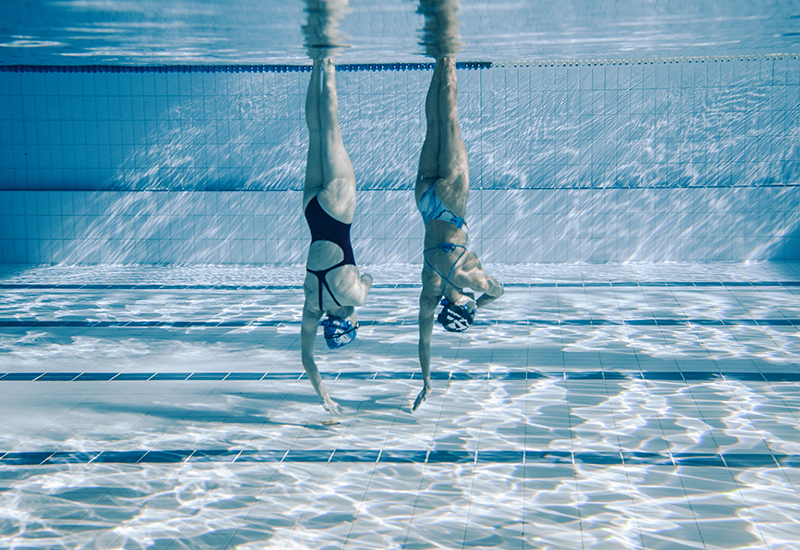
To be clear, the precision and balance needed in synchronized swimming is critical. Judges have been known to disqualify teams for a mistake of one degree in a circle, for example. One degree. If you consider that a circle has 360º, if the duet turns 359º it’s still not enough.
The depth of Sylvia’s knowledge and experience has yielded concrete results for Portugal.
When she arrived, the Portuguese artistic swimming team placed second to last in the world. Today, after almost seven years of her tutelage, they placed 11th and 15th in the International Competition in Budapest in 2023.
This puts the young Portuguese duet in an excellent position to qualify for the 2024 Olympics. The first 18 teams out of around 50 in Qatar in February will go on to Paris this summer to compete for a gold medal. By 9 February, the pair will know if they made it or not.
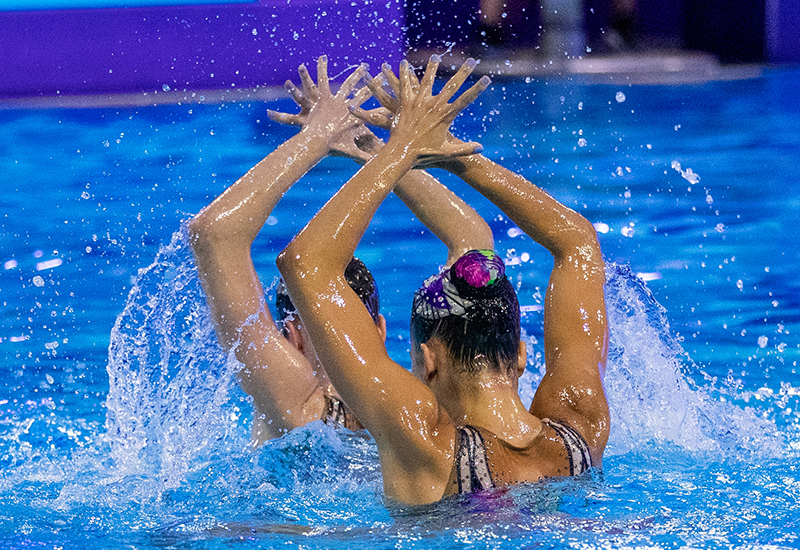
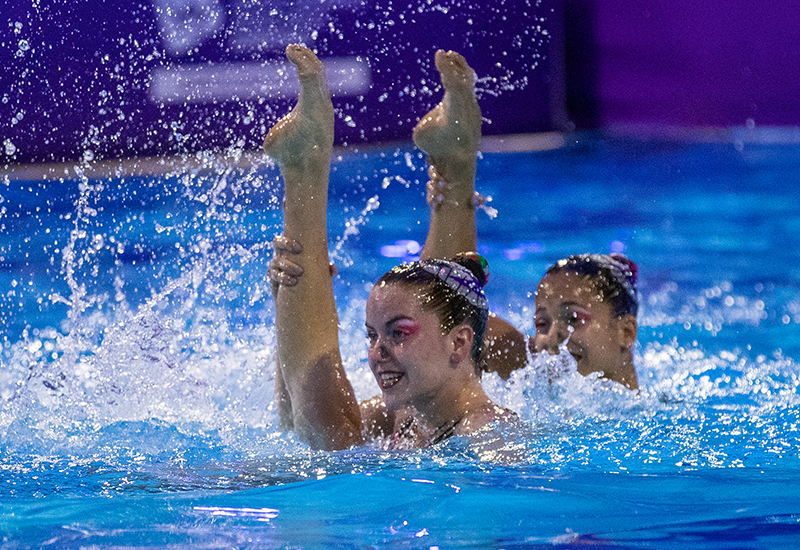
Part of being a good coach is knowing how to mandate the training program. And that’s no small accomplishment. There are so many other experts involved in the rigorous regime for this duet that Sylvia has a hard time remembering them all.
The girls spend 40 hours a week either rehearsing in the water with Sylvia or using video to examine their body positions, timing and choreography so that they are perfectly aligned. And perfect means with no margin for error. Not even one degree.
When they’re not in the water, the girls have cross-fit classes to build strength with Leonardo, yoga and mindfulness classes with Joanna, swimming lessons with Filipe and ballet classes with Denise. Perhaps the most important part of their structured and rigorous training regime, however, relates to food. Their online nutritionist, a Brazilian woman named Marcela, gives them set menus for each day.
“If they’re sick, it changes,” says Sylvia. “If they’re in a competition, she might give them more carbohydrates. If they have an infection, she shifts their diet to help them recover faster. I didn’t really believe in this so much, but this has made the biggest change of all.”
Unlike what people might think, their diet isn’t about staying skinny. It’s about their overall energy levels, their muscular strength and their mental state. Eating right lowers their levels of inflammation and keeps them healthier mentally – especially when it comes to glucose.
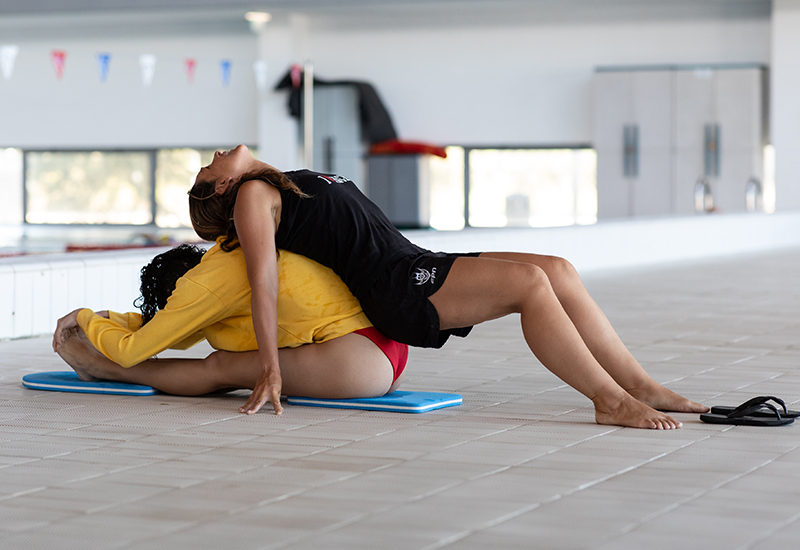
“The head is 200% of this sport,” says Sylvia in a serious tone. “Not everyone has the mental strength for this. But this is the most important part.”
And it certainly takes an incredibly strong mentality to overcome the challenges – from the not quite warm enough water where they train (27 OC!) to the financial difficulties (Portugal only supports athletes once they have proven themselves in competitions), and for this Lisbonian duet, the homesickness.
“The hardest part of this for me is being away from home,” says Cheila. Choosing to follow Sylvia to Lagos and leaving Lisbon means missing family gatherings and not being able to go for short walks on the beach with her boyfriend or jump out for a quick coffee with friends.
After the pair started serious work and committed to their joint goal of reaching the Olympics in 2017, there have been times when she wanted to walk away.
“It’s not like everything is always perfect,” she says. “There are ups and downs. The four things that keep me going are having my loved ones showing me support and giving me pep talks, remembering that Beatriz and Sylvia are in this with me and they depend on me as I depend on them because we are a team, thinking about all the Portuguese artistic swimmers who look up to us, and of course knowing that we are aiming for something tremendously big: to be the first Portuguese team to qualify for the Olympics in artistic swimming.”
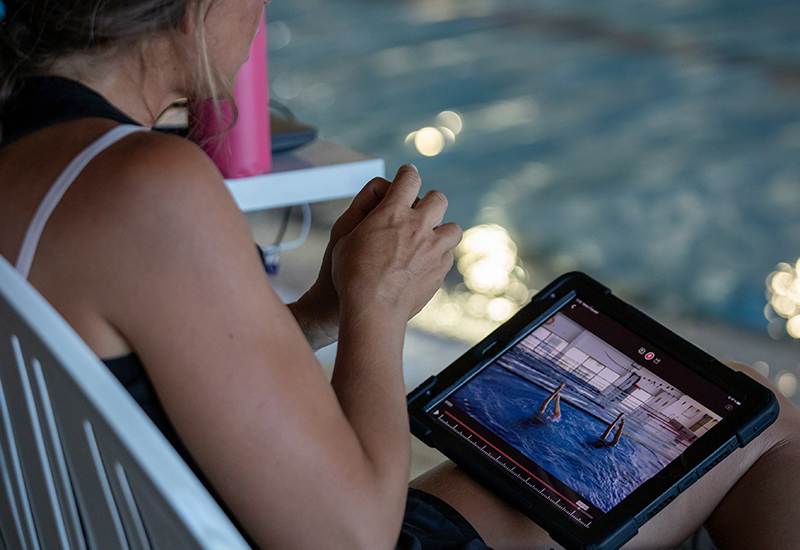
Of course, the trio is hoping for the best results: to have the chance to compete in Paris this summer. But after the climb they’ve made in the last six years, even if they don’t make it to the Olympics, they should be immensely proud of how far they’ve come. From almost last place in the world, they have soared to unimaginable heights in a short amount of time.
Aside from the concerns about geopolitics in Qatar, which makes Sylvia a little nervous, she is most concerned about the specific guidelines for movement and how they are applied.
“There are new rules and new base marks and new levels of precision and they are not completely clarified yet,” she explains. “For a coach, this is a nightmare and this is what I am most afraid of.” She cites an example from the recent world championships in which a duet completed a movement with their legs closed for many competitions, but then, suddenly, some judges understood that their legs should have remained open for that movement. Because of this variance in comprehension, that team didn’t make it to the next level.
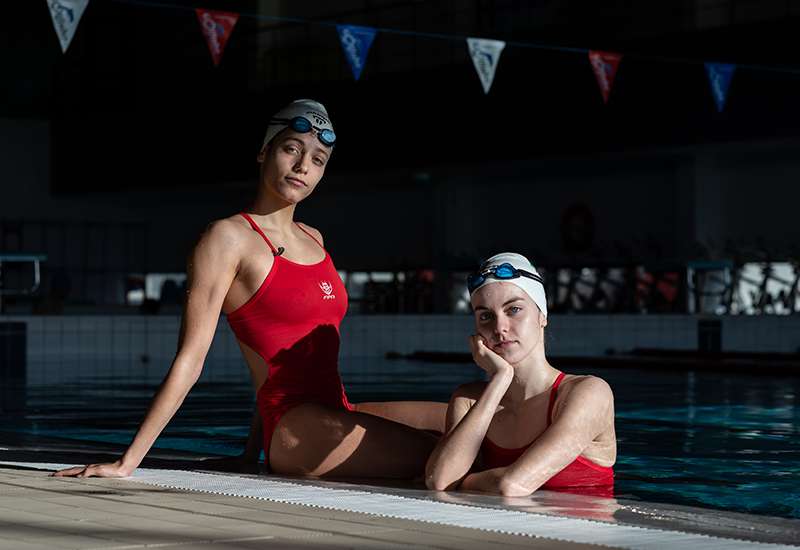
Overall, however, Sylvia feels excited about this opportunity and ready to meet the challenges. This is the moment they have been training for. It is the day they have prepared for, and it is the competition of their lives.
Although Sylvia has been coaching for over 24 years, this will be the first time she is the head coach for an Olympic duet. It’s a lot of pressure, but she knows they are ready.
Using their deep awareness of water and their connection to it on a physical, mental and spiritual level, this trio is certainly one to watch. And if you’re from Portugal – and especially from Lagos – it’s the team to cheer for, the ones who have risen so quickly and the first ones to ever make it this far.
*The results from Qatar will be finalised by February 9, 2024.
